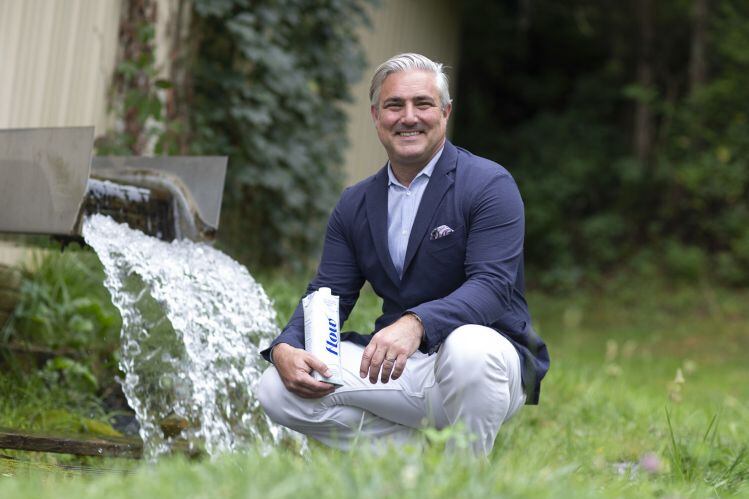Toronto-based Flow, which launched its first products in 2015, is planning a reverse merger, with the stock expected to be listed on the Toronto Stock Exchange in the first half of 2021. As part of the transaction, Flow is looking to raise a minimum of CAD$65m (US$52m), of which CAD $30m has been committed from existing shareholders as part of a non-brokered financing. The rest has been raised through a brokered private placement of subscription receipts.
“We’ve got 17.5m customers in North America today,” said Reichenbach. “But 192m people are buying premium water, so there is a huge opportunity to expand and take this all the way, to build Flow into America’s #1 domestically-sourced and responsibly packaged beverage company.”
If you’re in the business of selling water - something that already comes out of the faucet in every home, albeit without the same taste profile - you’d also better be pretty good at marketing, something that Flow Water appears to be rather adept at if the number of celebrities that line their fridges with it is anything to go by.
Not the usual playbook
Historically, the playbook for a successful venture-backed beverage brand has been to “get to north of $100m and then a big guy would come along and buy you,” says Reichenbach, who had an epiphany at the Burning Man festival in Nevada in 2013 that got his entrepreneurial juices flowing (“When I left I just remember seeing this huge mountain of plastic bottles, and I thought there has to be a better way”).
But the Beyond Meat IPO changed the game, claimed Reichenbach, who launched his first products in Tetra Paks in 2015 and is now selling Flow in 25,000 stores from Whole Foods to CVS, Walmart, and Vitamin Shoppe, with celebrity fans from Kim Kardashian to Gwyneth Paltrow re-hydrating with the brand (pH 8.1), which now includes flavored, collagen-infused, and vitamin-infused variants.
“It made the capital markets and the market at large aware that you could take a mid- to long-term growth view on a high growth emerging category leader and finance it through the public markets. So we saw a window open up for similar companies to build scale.”
Meanwhile, raising money in this way doesn’t mean an acquisition is off the table down the line, he noted, “People buy public companies all the time.”
Star power…
As to whether a beverage brand with a relatively modest $25m (USD) in sales in 2020 (+44% on 2019) has the game-changing potential of Beyond Meat, that’s a matter of opinion.
However, Flow’s business model is very different to your average beverage startup in that it has north of $100m in assets; it owns the artesian springs where it sources its water plus two sizeable aseptic filling facilities run by Planet A Co-packing in Virginia, USA; and Ontario, Canada; which also works with beverage brands such as Vita Coco, Nooma, and Purity Organic using Tetra Pak Prisma aseptic containers.
Reichenbach has also managed to woo some high-profile executives (Nestlé Waters boss Maurizio Patarnello has just been lured out of retirement to come in as CEO) and a glittering roster of celebrity investors and influencers, from singer Shawn Mendes to pro-basketball star Russell Westbrook, some of whom will be headlining an upcoming marketing campaign that will highlight the brand’s commitment to move the industry away from plastic towards what it claims is more sustainable packaging.
According to new data from SPINS, US retail sales* of shelf-stable bottled water (which includes enhanced and flavored products, both still and sparkling) rose +11.19% to $15.8bn in the 52 weeks to Feb 21, 2021.
- Enhanced water +10.53%
- Sparkling water +20.4%
- Sparkling flavored water +30.6%
*Includes natural enhanced channel and conventional multi-outlet channel, excludes c-stores.
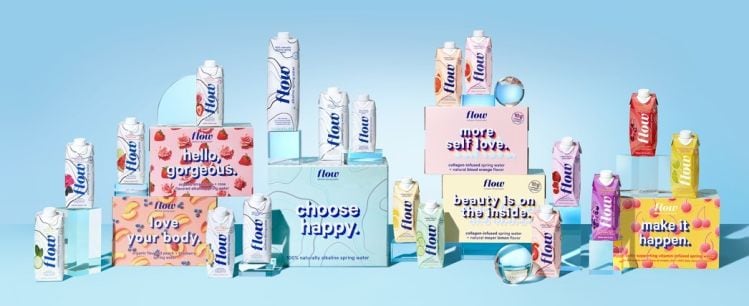
We want to build Flow into America’s #1 domestically-sourced and responsibly packaged beverage company
From the beginning, says Reichenbach, he has been on a mission to be the “#1 enhanced water company and wellness beverage in the US market.”
And there’s a huge amount of runway in the US before you even start thinking about international markets, said Reichenbach, who is harnessing the skills of chief revenue officer Tim Dwyer (who has worked at Red Bull, PepsiCo and most recently, Vita Coco) to build out a national DSD network, which will take about two years, and half the proceeds of the raise.
While the US retail market for bottled water excluding c-stores grew a respectable 5.2% in the year to March 6, 2021 (Nielsen xAOC), the action is at the premium end of the market where Flow plays (see SPINS data above), said Reichenbach, who seeks to double his U.S. footprint over the next 18 months, and is adding new production lines to his Virginia production facility this year.
Nestlé’s recent move to sell mid-market brands such as Poland Spring, Deer Park and Pure Life, and focus on "international premium and mineral water brands and healthy hydration products such as functional water,” also sends a pretty clear signal of where it thinks the category is going, he said, further evidenced by its acquisition of alkaline water brand Essentia.
44% growth in 2020, despite challenges of COVID-19
COVID-19 threw every beverage company’s best-laid business plans out of the window, with a decline in foot traffic and the loss of summer programs, but Flow still notched up 44% revenue growth in 2020, picking up new business with Walmart and Sprouts and enjoying significant growth in e-commerce, which now accounts for almost 20% of its business, said Reichenbach.
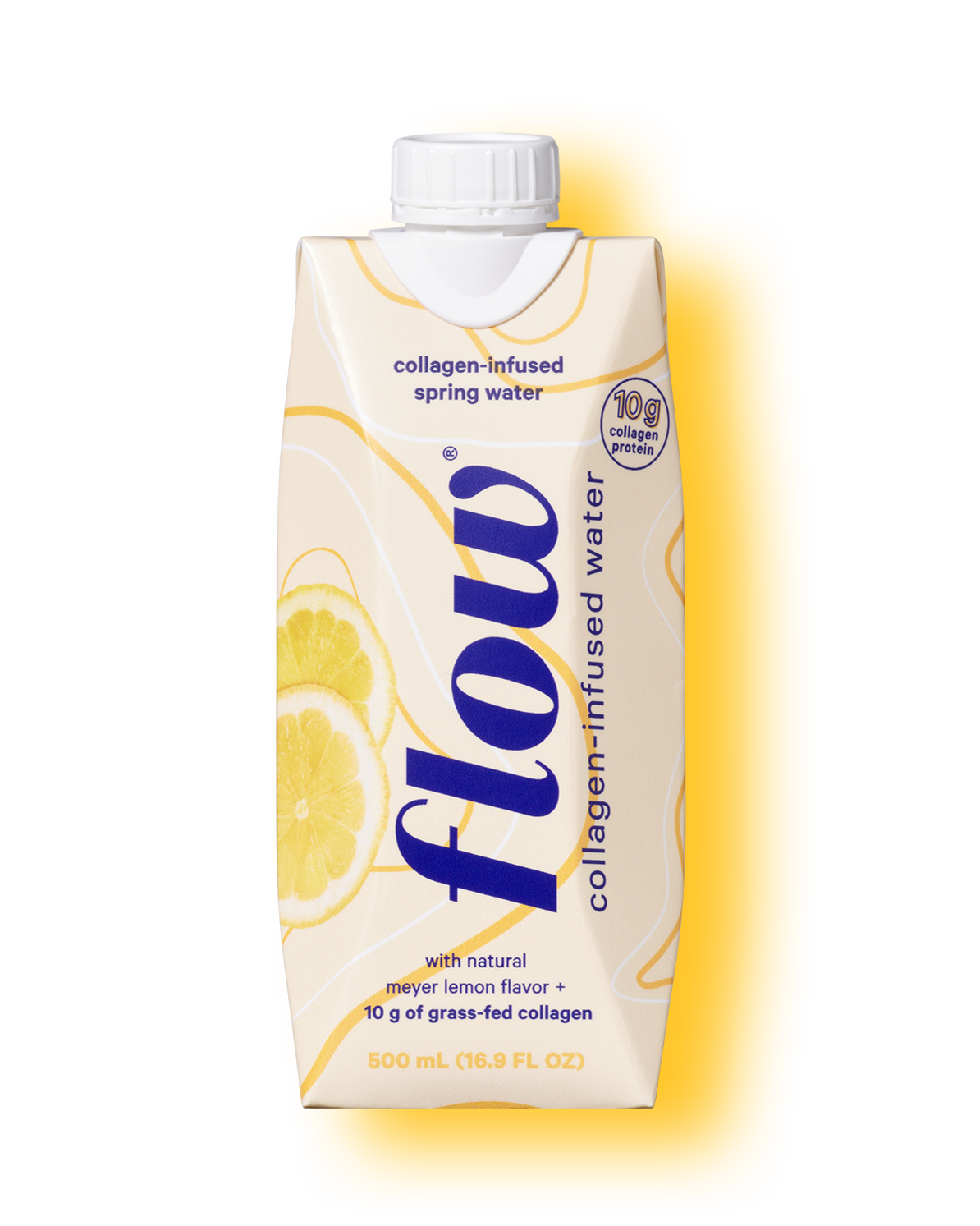
And the bulk of this is coming from subscriptions, the Holy Grail for any e-commerce business looking for both a reliable revenue stream and greater insight into who its customers are and what they want.
Functionality and wellness
As for products, multi-packs and larger pack sizes did particularly well last year, but there is growing interest in functional products, added Reichenbach, who said Flow’s collagen peptide-infused line had been a hit, and will be followed by a zero-sugar, organic, vitamin-infused line that taps into demand for immune system support (it’s being soft launched shortly ahead of a wider rollout in the fall).
Around 75% of Flow’s customers are women, who Reichenbach periodically quizzes to find out where they would like the brand to go next. “The #1 thing they told us they wanted was collagen, #2 was echinacea, but what they are really asking for is immune support, and there’s no better way to deliver that than from vitamins with proven immune support benefits [the line contains B vitamins, plus vitamin C and zinc].”
He added: “Flow collagen water is growing rapidly and we will be probably #1 in collagen infused water by 2022. I’d say product innovation will probably account for 10% of revenues in 2021 and 20% in 2022.”
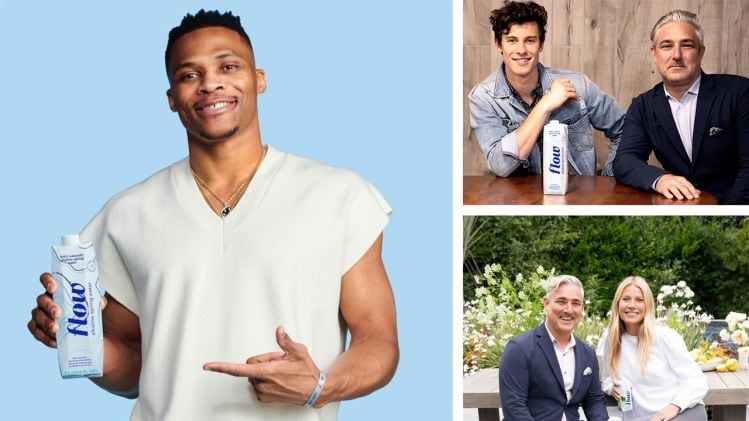
Bottled water and sustainability
Beyond functionality, however, a key factor in category purchasing decisions from retailers and consumers, going forward, will be environmental impact, he said, citing rising concerns about single use plastics in particular.
So how does Flow stack up in the sustainability stakes?
It’s a complex question, factoring in the sustainability of the water source, the energy involved in treating it (Flow uses filtration and UV light), the footprint of the packaging material, transportation, and post-use behavior.
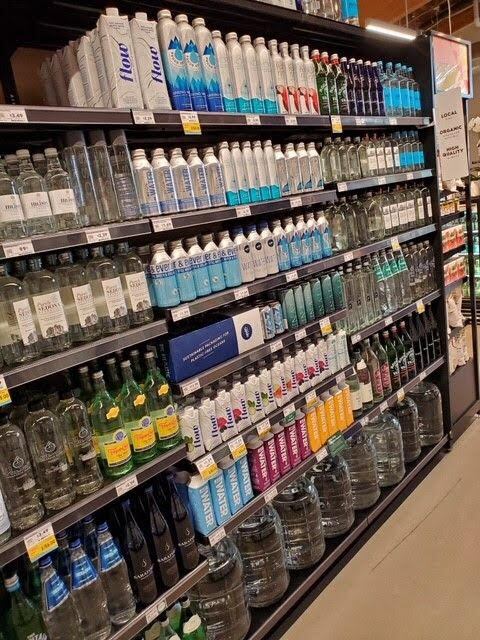
Just because a package is recyclable, for instance, doesn’t mean it’s necessarily going to be recycled. According to the Carton Council, recycling rates are going up rapidly as more places offer curbside pickup for cartons, but in 2019, the (US) recycling rate for cartons was estimated to be just 16% (Tetra Pak says 26% of used Tetra Pak cartoons were recycled globally in 2019), which means a lot of empty bottles of Flow are still going to landfill.
But if they do, said Reichenbach, at least three quarters of the package (the paperboard component) will biodegrade, unlike discarded plastic bottles.**
“We use Tetra Pak Prisma aseptic packs that are made with 75% renewables [paperboard from trees harvested in responsibly managed forests], a figure we want to see rise to 100% by 2025 [the rest of the package contains aluminum and polyethylene]. We also use a plant-based cap.
“Not everyone has access to Tetra Pak recycling facilities, but the percentage of places that do is rising all the time and it has a higher recycle rate than plastic bottles.”
‘Is it perfect? Absolutely not? Is it getting better? Yes’
It’s possible to argue that any company packaging and shipping water in bottles (whatever they’re made out of) when consumers can simply turn on the faucet and drink municipal water instead, shouldn’t win any prizes for saving the planet.
Bottled water associations, however, argue that most of the growth in bottled water is coming from consumers switching from other packaged soft drinks such as carbonates (that have a higher environmental footprint), not from people ‘trading up’ from tap to bottled water.
And if you’re going to drink bottled water, says Reichenbach, Flow Water has a lower environmental impact than the competition, because of the renewable materials used in the cartons, the fact it takes less water and energy to produce Tetra Pak than PET, and the fact rectangular Tetra Pak cartons can be packed more efficiently on a truck or shelf. And while aluminum might be more widely recycled, it takes more energy to produce.
“Is it perfect? Absolutely not? Is it getting better? Yes. And if I had my way, all RTD beverages would follow suit.”
*The ‘going-public transaction’ is a reverse takeover involving Flow and a newly-created entity called RG One Corp.
**A spokesperson for NAPCOR, the trade association for the PET plastic packaging industry in North America, told FoodNavigator-USA that 70% of carbonated soft drink, fruit juice, dilutable drink and water bottles are made from PET, which has a higher US recovery rate (27.9%) than that of cartons.

